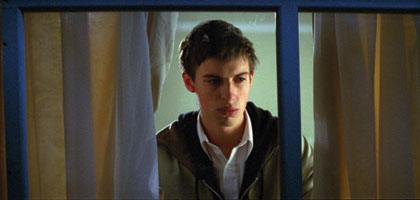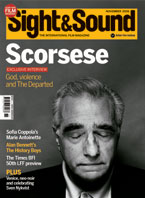The Great Ecstasy of Robert Carmichael
UK 2005

Reviewed by Ryan Gilbey
Synopsis
Our synopses give away the plot in full, including surprise twists.
Sussex , March 2003. Schoolboy Robert Carmichael lives with his mother in the coastal town Newhaven. He begins taking drugs with classmates Joe and Ben. He is given ecstasy by Joe's cousin, Larry, who's just left jail, before going with his friends to the home of a local drug dealer. There, Larry's girlfriend, Marie, is raped by Larry and Ben while Robert watches a news bulletin about the beginning of the war in Iraq. During a media studies project, Robert attacks a fellow student when he is asked to share the video camera the class is using. Larry is arrested and returned to prison for possession of drugs.
After playing the cello at a school concert, attended by local celebrity chef Jonathan Abbott, Robert is persuaded by Joe and Ben to join them in taking Larry's remaining pills. As the townsfolk begin searching for the missing Marie, Robert goes with Joe and Ben to Abbott's house where they rape the chef's wife and kill the couple. Marie's body is discovered by the police.
Review
Should Peter Greenaway ever film a script by Bruno Dumont featuring characters conceived by Mike Leigh, the result might resemble The Great Ecstasy of Robert Carmichael. First-time writer-director Thomas Clay shows a highly imaginative grasp of film grammar. He favours dissolves rather than hard cuts to move between shots, which creates a dreamlike atmosphere during even the most unsavoury sequences. His use of music, from Purcell to dub reggae, complicates every image. And his choice of camera movements, in particular sideways dollying shots, recalls early Godard. In all other areas - especially the integration of ideas into action, and the directing of his cast - he exhibits serious deficiencies.
Despite the breathtaking work by Yorgos Arvanitis, Theo Angelopoulos' long-time cinematographer, who invests parochial England with an eerie grandeur, the residents of Newhaven will not be jumping with joy at the depiction of the coastal town as a hotbed of drug abuse, rape and murder. Through this hell wanders teenager Robert, a good student and accomplished cellist whose dabbling with ecstasy precedes violent behaviour that escalates out of control.
However, it is not the drugs that are to blame, but the climate of international hostility. The Iraq war permeates the film, news broadcasts of which are glimpsed throughout. A young victim of bullying is nicknamed "Osama" by his tormentors, who search his school bag for weapons of mass destruction. A media studies project involves the students collaborating on a short war film, which is disrupted when Robert wrestles a classmate for control of the video camera in a triumph of symbolism over subtlety that is characteristic of the picture.
In another sequence, television footage of Tony Blair justifying the decision to go to war, watched by Robert in a drug-induced haze, competes for the viewer's attention with the sound of an off-screen rape. The likelihood that teenagers might prefer to get strung out while watching BBC News 24 rather than MTV or porn provides the first example of plausibility being sacrificed to make a point - though not the silliest. That distinction is saved for the end of the film, when the people of Newhaven join the police to comb the town - at night, just to make things harder - for a teenage girl who has been missing for less than 24 hours. We are supposed to be shocked that Robert and his friends, who were complicit in the girl's disappearance, are getting high while the search takes place. But the dominant message is that if you're going to disappear anywhere in England, do it in Newhaven, where they really pull out the stops to find you.
Wherever Clay's film is screened, it generates controversy with its final sequence, in which the teenagers commit a horrific act of sexual violence. But it is hard to take too much offence at a work that displays such neediness in its desire to shock. The picture operates on the same level as placards at a rally: when Clay and co-writer Joseph Lang want to convey information, whether Robert's estrangement from his father, or the brutalising effect on society of a government that goes to war on a whim, they simply signpost it. A talent for processing raw material into drama is not yet in their repertoire.
There is even one character, a media studies teacher, who helpfully mentions the film-makers' influences (Come and See, Triumph of the Will), and warns his class to ask themselves, when watching a film, "Who made this? Why did they make it? What's their agenda?" The lengths to which Clay goes to tutor us in deconstructing his film would be touching if they weren't so patronising - or if there were not so little to deconstruct.
Credits
- Directed by
- Thomas Clay
- Produced by
- Joseph Lang
- Written by
- Thomas Clay
- Joseph Lang
- Director of Photography
- Yorgos Arvanitis
- Edited by
- David Wigram
- Production Designer
- Atilla Raczkevy
- Music
- Elgar
- Harvey
- Purcell


